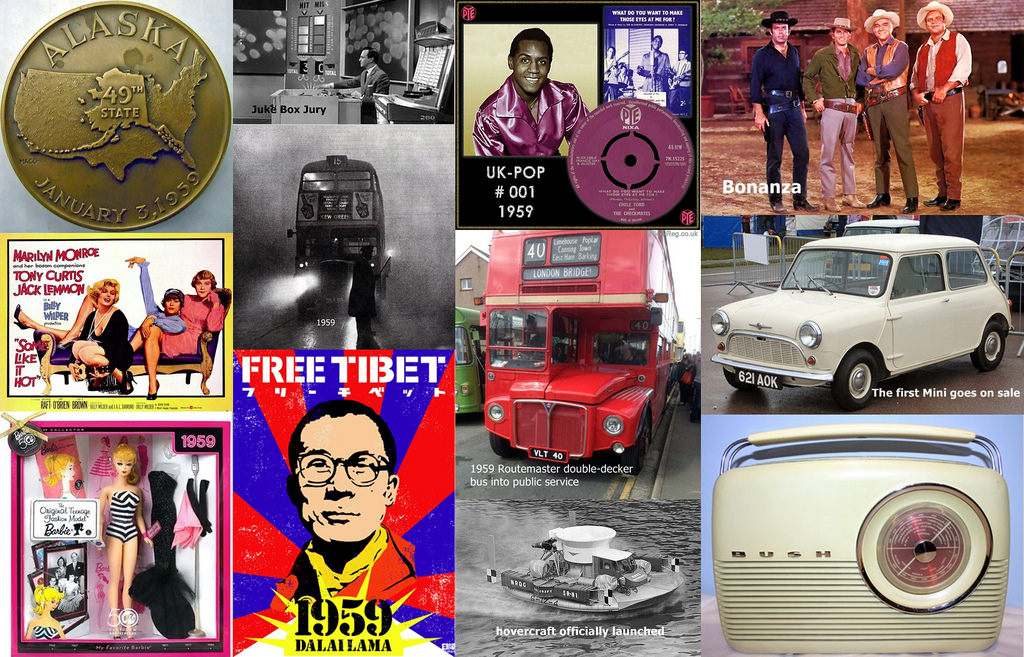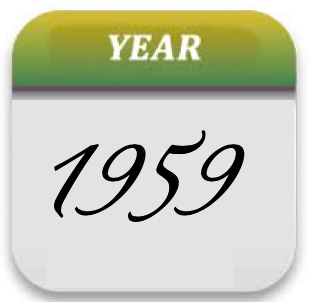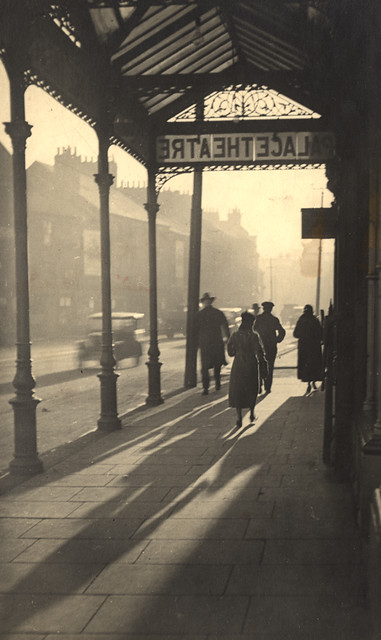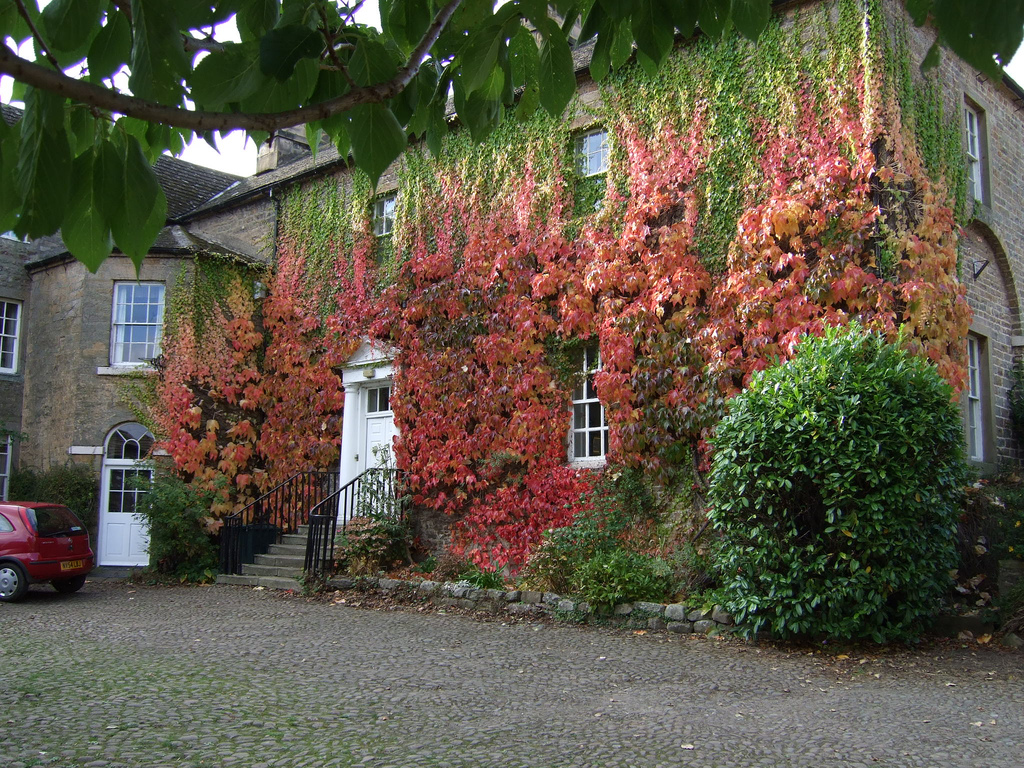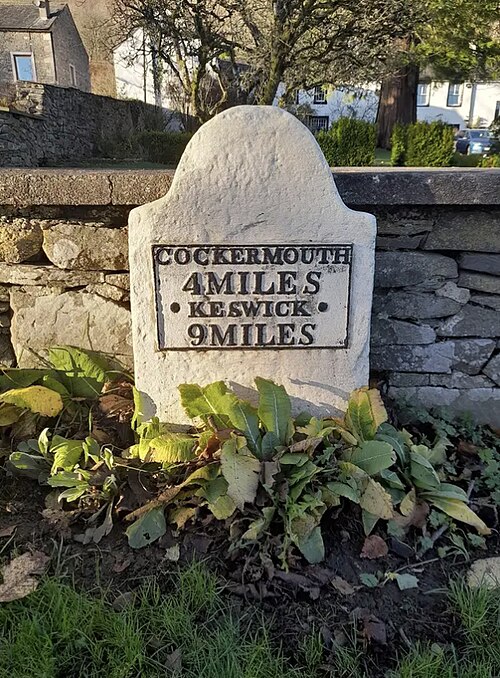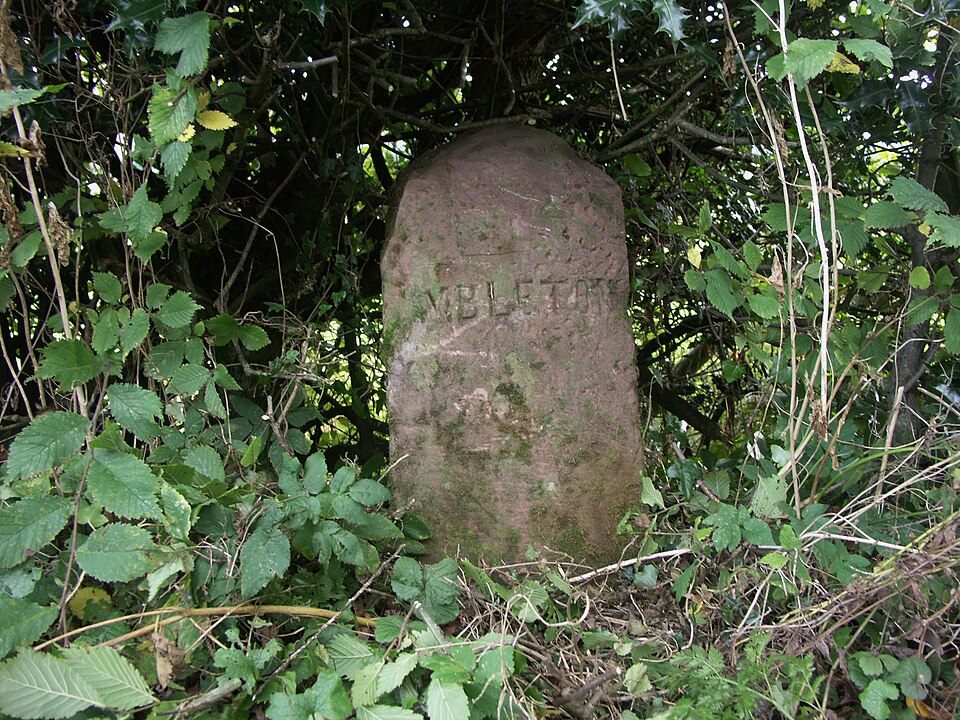That Was the Year That Was - 1959

-
Description
World News & Events 1959 1959 the unemployment problems eased to 5.5%. Television programmes included "Rawhide", "Bonanza" and "The Twilight Zone", movies included "Some Like it Hot", "Ben Hur" and "North by Northwest". Alaska is admitted to the union and becomes the 49th state and Hawaii is admitted to the the Union and became the 50th State. The Boeing 707 Jet Airliner comes into service and little girls love the Barbie Dolls created by Ruth Handler and made by Mattel. Fidel Castro comes to power in Cuba. Chad becomes autonomous republic in French Community. Rohan Kanhai completes 256 v India at Calcutta. USSR launches Mechta (Luna 1) for 1st lunar fly-by, 1st solar orbit. Luna 1 (Mechta) becomes 1st craft to leave Earth's gravity. "Bozo the Clown" live children's show premieres on TV. Tibetans revolt against the Chinese in Lhasa, but the uprising is suppressed. The Dalai Lama and tens of thousands of Tibetans flee to India. UK News & Events 1959 Direct Dial Payphones Introduced In The UK. 15 January – Tyne Tees Television, the ITV franchise for North East England, goes on air. 29 January – Dense fog brings chaos to Britain. 19 February – The United Kingdom grants Cyprus its independence. 23 February – Prime Minister Harold Macmillan holds talks with the Soviet leader Nikita Khrushchev on a visit to the USSR. 7 March – Independence movement leader Kanyama Chiume, wanted in the British territory of Nyasaland, flees to London and goes into hiding. 30 March – 20,000 demonstrators attend a CND rally in Trafalgar Square. 1 April – The official name of the administrative county of Hampshire is changed from 'County of Southampton' to 'County of Hampshire'. 2 April – United Dairies merges with Cow & Gate Ltd (of Guildford) to form Unigate Dairies. 22 April – Ballerina Margot Fonteyn is released from prison in Panama having been suspected of involvement in a planned coup against the government of president Ernesto de la Guardia. 30 April – Icelandic gunboat fires on British trawlers in the first of the 'Cod Wars' over fishing rights. May – First Ten Tors event held on Dartmoor. 2 May - The Chapelcross nuclear power station in Scotland opens. Nottingham Forest beat Luton Town 2-1 in the FA Cup final at Wembley Stadium. 7 May – Scientist and novelist C. P. Snow delivers an influential Rede Lecture on The Two Cultures, concerning a perceived breakdown of communication between the sciences and humanities, in the Senate House, University of Cambridge. It is subsequently published as The Two Cultures and the Scientific Revolution. 24 May – British Empire Day becomes Commonwealth Day. 28 May – Mermaid Theatre opens in the City of London. June – Import tariffs lifted in the United Kingdom. 1 June – First showing on BBC Television of Juke Box Jury chaired by David Jacobs. 3 June – Singapore is granted self-governing status. 11 June – Christopher Cockerell's invention the hovercraft officially launched. 22 June – Harrods enters talks with Debenhams over a possible £34 million merger. 23 June – Klaus Fuchs released from Wakefield prison having served over nine years for giving British nuclear secrets to the Soviet Union. July – Cliff Richard and The Drifters release a recording of the song "Living Doll" written by Lionel Bart. 28 July – UK postcodes are introduced for the first time, as an experiment, in the city of Norwich. 29 July - Mental Health Act becomes law, modernising the care of mental disorder. 30 July - Obscene Publications Act becomes law. Legitimacy Act becomes law, permitting the legitimisation of a child, one of whose parents was married to a third person at the time of their birth, by subsequent marriage of the parents. 4 August – Barclays become the first bank to install a computer. 24 August – House of Fraser wins the bidding war for Harrods in a £37million deal. 26 August – The first Mini goes on sale. 31 August – Harold Macmillan and United States president Dwight Eisenhower make a joint television broadcast from Downing Street. 18 September – Auchengeich mining disaster: 47 miners die as the result of an underground fire at Auchengeich Colliery, Lanarkshire, Scotland. 7 October – 300 people need to be rescued when a fire breaks out on Southend Pier. 8 October – General Election results in a record third successive Conservative victory, with the slogan "Life's better with the Conservatives", following a heated elections campaign by the Tories and the Labour opposition, who contested their first general election until the leadership of Hugh Gaitskell. Harold Macmillan increases the Conservative majority to 100 seats. Among the new members of parliament is Margaret Thatcher, who turns 34 on 13 October and represents Finchley in North London. 12 October – Large-scale diamond robbery in London. 21 October – Mau Mau leader Dedan Kimathi is arrested in Nyeri, Kenya. 30 October – Ronnie Scott's Jazz Club opens in the Soho district of London. 2 November – The first section of the M1 motorway is opened between Watford and Rugby. It is set to be extended over the next few years, southwards to Edgware and northwards to Leeds. 5 November – Philip John Noel-Baker wins the Nobel Peace Prize. 11 November – London Transport introduces the production Routemaster double-decker bus into public service. 14 November – The nuclear Dounreay Fast Reactor in Scotland achieves criticality. 17 November – Prestwick and Renfrew Airports become the first in the U.K. with duty-free shops. 20 November – Britain becomes a founder member of the European Free Trade Association. December – Health enthusiast Dr. Barbara Moore walks from Edinburgh to London. 6 December – Aberdeen trawler George Robb runs aground at Duncansby Head in Scotland in a severe gale with the loss of all 12 crew. 8 December – Broughty Ferry life-boat Mona capsizes on service to North Carr Lightship in Scotland: all eight life-boat crew are lost. 28 December – Associated-Rediffusion first airs the children's television series Ivor the Engine, made by Oliver Postgate and Peter Firmin's Smallfilms in stop motion animation using cardboard cut-outs. London County Council completes first portion of Alton Estate in Roehampton, southwest London, considered a model of post-war public housing. "Aluminium War": Concluding the first hostile takeover of a public company in the UK, Tube Investments (under its chairman Ivan Stedeford), allied with Reynolds Metals of the United States and advised by Siegmund Warburg of S. G. Warburg & Co., secure control of British Aluminium. The iconic Bush TR82 transistor radio, by Ogle Design, is launched. North of Scotland Hydro-Electric Board's Sloy-Awe Hydro-Electric Power Scheme becomes fully operational. Car ownership in Britain now exceeds 30% of households. Economic growth for the year is a very strong 7.2% while the Retail Price Index shows a zero percentage change over the year. Ballads and Blues folk club founded by Ewan MacColl and others in a London pub in Soho as part of the second British folk revival. Popular Films Ben-Hur Some Like It Hot Anatomy of a Murder North by Northwest Sleeping Beauty Popular Singers Doris Day Frank Sinatra Connie Francis Jim Reeves Cliff Richard Ella Fitzgerald Elvis Presley Adam Faith Pat Boone Buddy Holly Emile Ford & The Checkmates Eurovision Song Contest 1959 - "Sing, Little Birdie" by Pearl Carr & Teddy Johnson which won the UK national and went on to come second in the contest, it was the UK's best result up until that point. Popular TV Programmes Bonanza premieres on NBC, the first weekly television series broadcast completely in color. Juke Box Jury premieres on BBC Television Dixon of Dock Green (UK) The Huckleberry Hound Show The Adventures of Brigadier Wellington-Bull (1959) Spycatcher (1959–1961) Noggin the Nog (1959–1981) The Artful Dodger (1959) Bleak House (1959) Whicker's World (1959–1988) Ivor the Engine (1959, 1975–1977) Sport The 1959 British Grand Prix was a Formula One motor race held at the Aintree Circuit. The race was won by Australian Jack Brabham taking his second Grand Prix victory in a works Cooper T51. Brabham dominated the race, leading all 75 laps to win by 22 seconds over British driver Stirling Moss driving a British Racing Partnership entered BRM P25. It was the first time a BRP entry finished in the top three. Brabham's Cooper Car Company team mate, New Zealader Bruce McLaren finished in third place, just 0.2 seconds behind Moss, having lost second place late in the race. Harry Schell finished fourth for the Owen Racing Organisation BRM team a lap behind Brabham. Cricket - England won all five Tests against a disappointing India, including three innings victories. This was the first time England had won all five Tests in a single series. Football - August 1958: The Football League season begins with the new national Third and Fourth divisions that have been created from the old Third Division North and Third Division South. 30 August 1958: The Football Association snub Manchester United's wish to participate in the 1958–59 European Cup. September 1958: Manchester United pay a national record fee of £45,000 for Sheffield Wednesday inside-forward Albert Quixall. 12 November 1958: Wolverhampton Wanderers play their first European Cup game, drawing 2–2 at home to Schalke 04 in the first round first leg. 18 November 1958: Wolverhampton Wanderers lose 2–1 to Schalke 04 in the European Cup first round second leg in West Germany, ending their hopes of being the first team other than Real Madrid (winners of the first three competitions) to win the European Cup. 15 January 1959: Second Division Liverpool suffer a shock FA Cup third round exit when they lose 2-1 to non league Worcester City. 2 May 1959: Nottingham Forest defeat Luton Town 2–1 in the FA Cup final. 8 September 1958: Bobby Moore, 17-year-old centre-half, makes his debut for West Ham United against Manchester United in the First Division. May 1959: Billy Wright, 35, Wolverhampton Wanderers and England captain, after more than 500 appearances for his club and a record 105 for his country. June 1959: Jackie Blanchflower, 26, Manchester United and Northern Ireland centre-half, who announced his retirement as a player after failing to recover sufficiently from injuries sustained in the Munich air disaster 16 months earlier. Footballer of the Year – Syd Owen (Luton Town) Top goalscorer - Jimmy Greaves, (Chelsea), 33. -
Owner
brizzle born and bred -
Source
Flickr (Flickr) -
License
What does this mean? All Rights Reserved (Seek permission to reuse)
-
Further information
Link: https://www.flickr.com/photos/20654194@N07/27269577076/
Resource type: Image
Added by: Peter Smith
Last modified: 5 years, 8 months ago
Viewed: 2218 times
Picture Taken: 2016-05-28T12:04:24 -
Co-Curate tags
